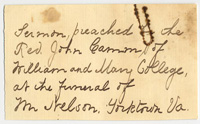
Sermon, preached by the
Rev. John Camm of
William and Mary College,
at the Funeral of Mr. Nelson, Yorktown Va.
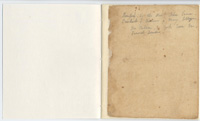
Preached by the Revd
John Camm
President of William & Mary College
Mr. Nelson, of York Town Va.
Funeral Sermon
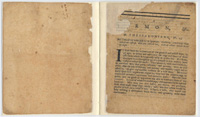
[A SER]MON, &c
1st
THESSALONIANS IV, 13.
But I would not have you to be ignorant, brethren, concerning them
which are asleep, that you sorrow not, even as others which have no hope.
It hath been the endeavours of the greatest and wisest Men, in
all ages, to soften and take away the edge and smart of those
afflictions which so frequently befall us in this life. But some,
that have been thought to go the farthest in this matter, have
really overshot the mark: They laboured, with much subtlety,
to convince men that pain, diseases, and poverty, were no real
evils; that the loss of friends, and power, and wealth, ought not to
affect us, or give any sensible concern to a wise man. However
finely spun such arguments might be, they had the disadvantage to
contradict common experience and common sense: Men felt their
pains, and no gloss or argument was able to convince them of the
contrary. In spite of whatever reasonings, evil appeared in its natural
horrours: Men were sure that losses, and thorns, and pressures,
were what made them very uneasy; and, whether others would be
pleased to call them evils or not, it signified little, they could not
help wishing a deliverance from them, and groaning under their
continuance.
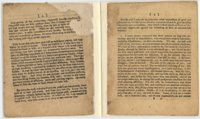
And among all the misfortunes wherewith human condition is
chequered there are few, perhaps none, that lie longer on [torn]
and sink deeper into our minds, than the loss of those wh[torn]
dear and valuable to us. When we are suddenly wou[torn]
tender a part, it raises convulsions in our breasts, we with [torn]
calm our tumultuous passions, the arrow sticks deep in our sides [torn]
the fretting pain often recoils upon us.
They know this who have ever lost an indulgent parent, lost him
before he could be spared. They are sensible of it who have had a
beloved husband or wife, or a hopeful child whom with much pains
and charge they have brought up, immaturely snatched away. We
have an afflicting experience of it when some circumstance or accident
reminds us of the sudden fall of a sincere and generous friend, whom
constant application and long services had made our own. These are
blows which our nature hardly supports itself under, often is oppressed
by. Philosophy fails us here, in its boasted assistances. It is, indeed,
on these occasions, a pardonable weakness to be for some time incon-
solable. It may be some time before we can listen to an exhortation
even from the blessed moutn of an Apostle, not to be sorry like men
without hope. And when we can conquer our rebellious passions,
and something soothe our sorrows, still, alas! we feel in our hearts
grievous returns of affliction, many and piercing regrets, especially
when we find the want of those whom we have lost.
But since the most valuable friends we possess are but mortal, since
most of us have lost many, and soon may lose all, it may not be
improper, towards lightening the evils that are past, towards arming
us against those that are to come, to reflect on the holy counsel of
Saint Paul, who bids us not to be sorry as men without hope.
To this end I propose to point out what expressions of grief are
allowable on the loss of our friends, and what are not so, but excessive
blameable and unchristian, after which I shall touch on some of the
principal arguments against the sorrowing in such an unallowable
manner.
1. I have already intimated that their notions are big with ab-
surdity, and full of impossibility, who would have us to be insensible,
perfectly dispassionate, on these occasions. We are, the best and
wisest of us, but men; we cannot always soar above mortal condition.
We read of bitter lamentations made by the Patriarchs for their father
Jacob, though he died in a very advanced age; and David breaks
out into many passionate and almost imprudent lamentations for his
ungracious but favourite son Absalom, O my son Absalom (says he)
my son, my son Absalom! would God I had died for thee. O Absalom!
my son, my son! (2d Samuel xiii. 23) so much may innocent nature
struggle, even in the best. We read of the patience of Job; but
what sort of patience was it? Not an insensible suffering of wo. He
falls into great and many expostulations, even hard repinings, at the
dispensations of Providence; and indeed shows us, with the saint,
much of the man. It is his praise, and no little one it is, that he still
submitted, and blessed his holy name who was pleased, out of his
sovereign authority, to change the most prosperous condition for the
most amazing affliction. For the rest, he demonstrates that there
is but one copy perfectly fair, and worthy of our constant imitation;
even his, who, after strong crying and tears, put up that never to be
enough admired petition, Father, if it be thy pleasure, let this cup
pass from me; if not, thy will be done. Tears, if they are a weak-
ness, are a beautiful one, and fit not ungracefully on our nature.
B
[6]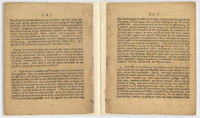
The all-perfect pattern whom we are to follow, the holy Jesus, not
only wept for the miseries which he saw threatening the incorrigible
Jerusalem, but shed tears for what his beloved Lazarus had suffered
in dying, though he was about to raise him again. This foible, as
some would term it, of our constitution, deserves not blame or con-
tempt, but love and pity. Sighs, regrets, and complaints, must
for some time be allowed to the unfortunate. A passion so deeply
implanted in our nature can never, in itself, displease the great author
of our being. He hath not here expressed his dislike of it. It is
enough if we sorrow not even as others who have no hope.
Nor it is to sorrow like those who have no hope long to remember
those whom we have loved and valued, and on some occasions to
regret the loss of them; for this is pure nature, it cannot be other-
wise among human creatures. It is not in our power to forget what
we please, or not to be sorry at the remembrance of what we had
reason to value. This then is not the grief condemned by the
Apostle; what is so is next to be considered.
2. That sorrow is excessive and blameable which is too violent in
the expression. One may violate that decency and good manners which
are still due to the living by seeming to have no regard or value for
those that remain, because we have lost those whom we most esteemed;
but this is an indecorum more pardonable than when we forget the
respect and veneration we owe to the holy majesty of God, the great
king of the universe, in whose hands are the souls of every living
creature, and the breath of all mankind. This is to reflect on his
wisdom, as if it saw not what was best, for us and others, as if the
punishment was more than we can bear, more than we have deserved.
This is to be most ungrateful, as if we regarded not either how long
[7]
God has indulged us with the blessing which he has thought fit to
take away, or how many other precious blessing he has still left us
possessed of. And as sorrow may be thus faulty in the manner, so
it may be equally blameable in the length and continuance of it:
We may lose all the comforts of like that remain, by continually re-
pining at what is gone; we may neglect all manly and social duties,
out of sullen regrets and peevish reflections on our misfortunes.
That grief is greatly to be condemned which endangers or ruins our
health, unfits us for conversation and the duties we owe to our friends,
our families, our country, or mankind. This is to sorrow like those
who have no hope; no hope in the divine goodness, which can, if it
pleases, repair the greatest of losses; no hope for a resurrections, of
that joyful time when those that sleep in Jesus (for of such the Apostle
and we are now speaking) shall meet again with joy and abundant
consolation. But this is one of the arguments, and the principal of
them, against sorrowing in an indecent, immoderate, and unchristian
manner. Of this, and the rest, we will now treat.
3. And first, let us observe a very obvious truth, but yet such a
one as those who indulge these excessive sorrows seem wholly to for-
get, or too little to consider; that is, that those whom they thus
excessively lament were but mortal. If we consider the human body,
of how nice a texture it is, how many thousand passages must be
kept open, motions, preserved, and decays repaired, that it may be
retained in being, one would rather be amazed by what wonderful
providence it is so long supported than why it declines so soon; es-
pecially if we add to this the many threatening dangers that surround
us from the inclemency of seasons, badness of air and provisions, not
to mention the hazards we expose ourselves to, for one end or other,
from the sea, weather, or places to which the many occasions of life
[ 8 ]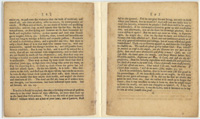 entice us, to pass over the violences that the bulk of mankind, and
entice us, to pass over the violences that the bulk of mankind, and
almost all, one time or other, offer to nature, by intemperance or
excess. Without any of these, we are made of brittle and perishing
materials; and we may as well lament that the sun sets, the sea is
tempestuous, or that spring and summer are so soon succeeded by
harsh and unpleasant seasons, as that mortal and frail man should
grow languid, sicken, die. It shows, then, a weak and inconsiderate
mind too long to indulge a sickly and unmanly passion. Fortitude
of mind is doubtless a virtue, and a graceful one too; but there is
only a small share of it in that man who cannot bear up, with any
equanimity, against the changes incident to, and inseparable from,
human condition. But it may be said, and it must be owned for a
truth, that all are not endued with magnanimity, and to those who
are not should be made all due allowances; yet, that they may not
indulge a hurtful weakness too long, let them consider that the thing
is unalterable. They may as soon by tears recall them that died a
thousand years ago, or sigh them into being who never yet were, as
stop the departing soul, or fetch up those whom the grave has just
shut her mouth upon. As the tree falleth, so it lieth. Man lieth
down in the dust, and shall not rise again till the heavens be no more.
In vain do they break their spirits and their rest; their friends owe
them no thanks that they impair their health, and neglect the duties
and comforts of life. The dead are still the same as if neither tear,
nor thought, nor lamentation, had been bestowed upon them. See
2d Samuel, xii. 22, 23.
If to this it should be replied, that the evils being without all possible
remedy is the chief source of their afflictions, let them then look up
to the hand that strikes them. Was it not the will of your heavenly
father? without which not a hair of your head, nor a sparrow, shall
[ 9 ]
fall to the ground. Did he not give life and being, not only to those
whom you lament, but to yourself? And will you not suffer him to
recall his favours, whenever he pleases? Dost thou well to be angry,
or dissatisfied, if he command a Gourd to grow up and overshadow
thee, and afterwards, out of the same his sovereign pleasure, bid a
worm destroy it again? But we need not recur to what, in supreme
right, he might do. Can we say that we have not deserved the
scourge that hath afflicted us? Doth not our conscience accuse us of
not only general infirmities and failings, but of many willful and gross
transactions? These cry to Heaven against us, and force the Almighty
to chastise us. We must all plead guilty before God: For, behold!
he putteth no trust in his angels, yea the Heavens are not pure in his
fight; how much more abominable and filthy is man! (Job, xv. 15)
Lay then thy hand upon thy mouth, and keep silence before him.
Humbly confess, Righteous art thou, O Lord, and just are thy dis-
pensations. Bear his fatherly correction with meekness and patience;
for surely it is meet to say unto God, I have deservedly born chastisements,
I will not offend any more. That which I see not, teach thou me. If
I have done iniquity, I will do no more (Job, xxxiv. 31, 32.
Let it be considered, farther, that he is not only just but good in
his proceedings. If we bear these evils as we ought, he will turn
them to our great advantage. If he did not see that we abused the
good he took from us; that we valued it so much as to forget the
donor; that it was necessary to take it from us, that he might wean
us from the world, and turn our thoughts to himself; if, I say, he
did not do this, however, it was the Lord, and it becomes us to say
let him do what seemeth him good.
C
[ 10 ]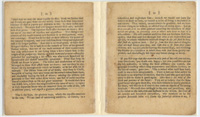
And that we may the more readily do this, think we farther that
our friends are gone from an evil world, from such who sometimes
imbitter all that is joyous and desirable in life, by their follies and
wickedness. No more shall evil tongues wound their ears, and dis-
turb their peace. The injurious shall offer violence no more; they
are out of the reach of injustice and oppression. The changes and
chances of this world cannot now threaten them with poverty, want,
and contempt. Death has set his seal on their actions; the power of
the tempter is expired, and their deflection from virtue and righteous-
ness is no longer possible. And this is no small good, to have died
in a good season; for it hath been the remark of some of the greatest
Roman writers, that one of the most eminent of their countrymen
was only unfortunate in not dying when a fever seized him in the
height of his prosperity, that the publick vows and prayers unhappily
prevailed for prolonging a life which was afterwards signalized by
innumerable and almost incredible calamities. They that sleep in
Christ are secure in peace. The follies and misfortunes of such as
belonged to them shall afflict them no more; nor can they be cor-
rupted by the contagious air which we breathe, or be led aside by ill
example. Far distant from evil of all kinds, they sleep in Christ,
incapable of having their own virtue and its rewards taken from them,
and charitably hoping the best of others; adoring the wisdom and
goodness of God who called them hence, and full of joyful expecta-
tion of a resurrection to life and glory immortal. It would then be a
too selfish love, a love that might deserve the name of envy, to repine
at their departure hence who are removed from the evils of life, rest
in absolute peace, and expect a glorious resurrection.
This is the hope, the glorious hope, which the Apostle mentions
in the text. We are fond of continuing ourselves, or friends, in a
[ 11 ]
calamitous and unpleasant state; because we would not leave the
society of those we love, or because a desire of living is implanted in
our nature. This, indeed, cannot always be gratified; but we have
the next thing to be wished, an assured hope of living again. Let us
then not act as if we were ignorant concerning the condition of those
which are asleep, in sorrowing even as others would have no hope in a
resurrection. We will comfort ourselves that our brethren shall live
again; that they now live through him who is the resurrection and
the life, in whom whosoever believeth though he die yet shall he live,
and shall die again no more. Let us go from thee then mortal thoughts
that are most heavy upon thee, and haste thee to fly from these times
(Esdras, xiv. 14) prepare for leaving this mortal stage, and revisiting
thy friends in a condition in which thou wilt find them greatly im-
proved, and everlastingly safe from any future change or decay.
If you still urge that this removes only part of the evil you endure,
your friends are, you doubt not, happy; but you yourselves are not
the less miserable, in losing the kind assistance you wanted, the
generous friendship which long acquaintance and infinite services, or
the ties of nature, gave you. This is indeed what must bear hard,
must be not a little insupportable. There is but one solid answer to
be made to an objection of this sort, that the Lord who gave and took
away is able to make it good again. Here then is the trial of the
faith and the patience of the Saints: They are to believe that the same
good father who gave them life, who hath hitherto so kindly provided
for them, will still do so if they do but continue objects of his loving
kindness. We trust then willingly to his care and protection, who
is the father to the fatherless and husband to the widow, the God of
all mercies and boundless compassion, who comforts us by his
prophet Jeremiah (xlix. 11) Leave thy fatherless children to me, I
[ 12 ]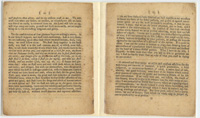 will preserve them alive; and let thy widows trust in me. We will
will preserve them alive; and let thy widows trust in me. We will
trust that when our father, or mother, or whomsoever else we have
our friend on earth, is removed from us, the Lord will take us up,
will wipe away our tears, protect and bless us on earth, and at length
bring us to his everlasting kingdom and glory.
To the consideration of that glorious hope we willingly return. It
is our firmest support, and most solid consolation. Life is very short,
we are hastening apace after those whom we most lament; soon, very
soon, we must follow them. We shall sleep together in the same
dust, nor shall it in the least concern any of us which went first.
But, to use those wonderful words which holy Job would have to be
written with an iron pen, and engraved on a rock for ever, we know
that our Redeemer liveth, and that on the latter day he shall stand upon
the earth; and though after my skin worms destroy this body, yet in my
flesh shall I see God, whom I shall see for myself, and mine eyes shall
behold, and not another (Job, xix. 25, 26, 27) O happy and glo-
rious day! when we shall meet not only with those whom we knew
and loved, and obliged, but with our predecessors, with the greatest
men which the first and best ages produced, with the saints and martyrs
of whom we have heard and read, when we shall see the great Saint
Paul, and, what is more, the great and dear redeemer of mankind.
O blessed time, when we shall be added to that blessed assembly of the
great and good, and shall leave the dregs and refuse of human nature
on earth behind us! For we shall not only go to the great men we
have been mentioning, but to our dear relations and particular friends,
whose piety, virtue, and generosity, we could not but lament, could
not bear the loss of, without much concern and repeated affliction.
As we have hitherto been detained on such topicks as are necessary
to break the force of the softer passions, and guard us against intem-
perate grief, on any the most melancholy occasion, it may be pre-
sumed, I hope that we are the better prepared, you to hear, and I
to make a few observations on, the conduct of that truly excellent
person whose funeral we are at present attending, to pay him our last
offices of respect. I mean not to present you with a flattering picture
of him, I do not pretend to do him justice; that could not be done,
I think, without trespassing on your patience, by passing the bounds
allowed to the conclusion of a discourse of this nature. If it could be
done, I am not the person to venture at more than drawing some of
the outlines of a portraiture which deserves to be coloured and finished
by the hand of a more skilful painter. What I have to say will, I
suppose, be little more than what you will be able to go before me
in; I shall be hardly more than an echo of what you must be saying
to one another.
A rational and firm piety, an active and constant affection for the
well-being and interests of mankind, a quick penetration, a solid
judgment, an uncommon fortitude of mind, a native fund of ease,
alacrity, and good humour, were some of the sources which united
their powers to compose the gentle and bounteous stream of his life
and conversation. If we could trace out, and follow, the course of
this stream, from its origin to its entrance into the wide ocean of eter-
nity, I am persuaded we should find it every an engaging object
of contemplations, we should behold it every where beautifying and
enriching the several soils through which it made its various and fer-
tilizing windings and turnings. But some parts only of such a specu-
lation, by way of sample, from which the whole may be judged of,
can be pursued by us at present.
D
[ 14 ]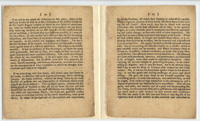
If we call to our minds his behaviour in this place, either at the
ordinary service of God or at the celebration of the blessed sacrament
of the Lord's Supper (neither of which he ever failed of attendance
at, when his health would permit him being present) we can scarce
help believing ourselves to be still witnesses of his unaffected and
ardent devotion, a devotion that was sufficient to infect, if I may use
the expression, all who needed such assistance with the life becoming
disposition, and stood forth as an obvious though modest reproof, by
its example, to the careless and negligent worshipper. He was a
faithful member of the church, but harboured no bitterness or resent-
ment against those of a different persuasion. His religion was indeed
amiable: It had no tendency to sour his temper, or inspire his mind
with gloominess, but had on him, as it ought to have on us all, a
quite contrary and more consistent influence. Like most other things,
for which he was remarkable, it sat easy with him. It was not
wordy or disputatious, but its effects went with him wherever he
went, silently operating, and without ostentation, to render him fitter
for the management of every transaction in which he thought it in-
cumbent upon him to be engaged.
If we went along with him hence, and waited upon him home to
his house, we there saw displayed to great advantage, and in a striking
manner, the tender husband, without his being drawn by the most
forcible of passions into any impropriety of behaviour which could
disgust the nicest observer: The indulgent parent, without his suf-
fering excess of fondness to take off his eye from the true and best
interests of his children; the most affectionate and obliging brother;
the useful and entertaining friend; the kind and generous master,
not more revered than beloved by his lowest domesticks, even by this
slaves, to whom he grudged not all the comforts and enjoyments,
[ 15 ]
let me say freedom, of which their situation is unhurtfully capable.
What a vigorous exertion of these lovely affections shone in him dur-
ing his last illness! How could they but be seized with unusual
admiration who beheld such affections rise in him, to the greatest
height, at a time when the mind is commonly too full of an approach-
ing and awful change, to surrender itself to their impressions. He
neglected no means likely to preserve him longer to his family. When
all these visibly failed, he sought not comfort from others, as is or-
dinarily done on such an occasion, but he imparted and administered
it to all around him. He applied himself to his last and most arduous
task, that of reconciling his distressed family to a disaster which it
was manifest could not be avoided, and which it became them to
submit to, if possible, without reluctance, as to the will of our Hea-
venly Father, who assuredly knows what is fittest for us. He laboured
this point with earnestness, attention, and perseverance, and succeeded
in it, at length, better than could be expected or imagined. After
enjoying the peculiar delight of perceiving his pains, in an under-
taking so singular, and so near his heart, not to be thrown away,
shall I say he met the King of Terrours with composure and resig-
nation? No, it was not the formidable spectre whom he saw advanc-
ing; it was the gentle and smiling messenger of peace and good
tidings. He gave his ready hand to the friendly conductor into
everlasting glory; he bade him welcome, and embraced him, as well
he might, with marks of high satisfaction in his countenance, and a
degree of pleasantry and familiarity in his expressions. Here all was
great, and noble, and natural, and of a piece with is preceding life;
for, surely, he who can look back on his past labours with approbation
has good cause to look forward to their reward with confidence.
He who has made it is first care and study to lead the life of the
righteous must be best entitled to that matchless and unrivalled ac-
[ 16 ]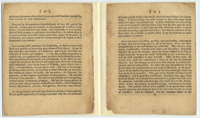 quisition, that crown of our fairest hopes and most laudable enterprises,
quisition, that crown of our fairest hopes and most laudable enterprises,
THE DEATH OF THE RIGHTEOUS.
Betrayed by the amiableness and sublimity of this last part of his
conduct, I have got too forward in my account of it before I was
aware. I must therefore turn back, but I shall take a very cursory
view of what remains to pass under our inspection; for where there is
so great a variety of matter many particulars cannot be so much as
mentioned, and others cannot be commented upon so largely as their
importance may demand.
In a country justly renowned for hospitality, he deserves to be held
forth as a pattern to succeeding generations of that virtue. It was in
him extensive and liberal, yet judicious, and not set free from the
restraints of reason and religion. It was not a blind propensity to
profuseness, or a passion for a name to which he sacrificed the reason-
able expectations of his family and descendents, or by which he cor-
rupted the morals of his friends and neighbours when his mind was
most unbended, even in the hours of festivity, upon which vice or
folly, or imprudence, are too apt to steal. He was no encourager
of intemperance or riot, or lewd and profane discourse, or an prac-
tice tending to injure the health, the reputation, the fortunes, the
manners, or the religious attainments of his company. He coupled
freedom with innocence. His raillery was pleasant and entertaining,
without being ill-naturedly poignant. He had the happy address to
perform with ease perhaps the most difficult of tasks, that of seasoning
mirth, facetiousness, and wit, with gravity, decorum, and wisdom.
As one of the first and most respectable merchants in this dominion
he had great opportunity of being acquainted with the circumstances
[ 17 ]
of many people whose cases would otherwise have escaped his know-
ledge. This knowledge was often turned to their advantage whose
affairs fell under his consideration. I think I shall have the concurring
voice of the publick with me when I say that his own gain by trade
was not more sweet to him than the help which he hereby received
towards becoming a general benefactor; and that he contrived at the
same time, by a double or mixed effort, to lay up treasures on earth
and treasures in heaven.
As he was a lover of justice, probity, and punctuality, with regard
to those who had nothing more to ask at his hands, so he was most
compassionate to the unfortunate and miserable. His charities were
many, considerable, disposed with choice and discretion; studiously
disposed too as to the manner, which he always wished to be such as
might make his bounty the most serviceable to the receivers of it,
and the least oppressive to their modesty. Had he been able, he
would have made his munificence a secret to all but his God and
himself; but the attempt to have it as little noticed as possible fre-
quently proved unsuccessful, for either the joy and gratitude of the
person relieved would break out and make a discovery, or the admi-
ration of the person employed to convey the benevolent gift could not
bear to let it be concealed. This part of his character became so well
established, and so generally understood, that some time ago, when
publick thanks for a charity were returned to a person who desired to
be unknown, universal conjecture gave the credit of it to Mr. Nelson,
while, in fact, the charity, to my knowledge, was bestowed by other
hands. The publick seemed to be possessed of an opinion that in this
equally generous and religious part of his behaviour he had no rivals
or imitators: God be thanked, that the common notion in this
E
[ 18 ]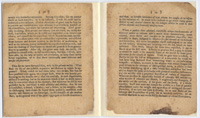 matter was somewhat erroneous. Setting this aside, for we cannot
matter was somewhat erroneous. Setting this aside, for we cannot
dwell on such remarks, he is an instance, I wish he could not be
reckoned a rare instance, of what abundance of good may be done by
a prudent and conscientious man without impoverishing himself or
his connections, nay while his fortunes are improving. Alas! gene-
rally speaking, they are not our virtues, but our vices, or, to say the
least, our follies, which are so costly and expensive as to devour our
estates, and exhaust the fountain from which they derive their nourish-
ment. An estate raised with an unblemished reputation, and diffused
from humane and devout motives in the service of multitudes, as well as
the owners, it may reasonably be expected will wear well, and
have the blessing of Providence to attend and protect it from genera-
tion to generation. After all, this great man had, no doubt, his
passions to contest with, as well as other men; but few, I think, have
been able, by the help of reason and revelation, to keep them under
better regulation, or to find them continually more virtuous and
ample employment.
Thus far we have surveyed him, only in his private walks. What
shall we say of the publick capacities and stations in which he ap-
peared? What, unless we had more time, can we say, but that he
here practiced over again, on a larger scale, what he was hourly per-
forming on the smaller one; that his conduct, in each department,
differing in nothing but in the materials which it had to work upon;
that he was every where in his element; that whatever he did he was
possessed by it, and filled it with assiduity and ability; that he was
a benefactor, a friend, a brother, and a father, to his country; that
in discharging these duties he found them perfectly consistent with
loyalty and fidelity to his sovereign, to the interests of the mother
state, to the general weal of the grand aggregate of British dominions;
[ 19 ]
and that, in humble imitation of him whom we ought all to aspire
to the imitation of, he made it his business to go about doing good,
stirred up and moved thereto by the delight which he took in that
divine exercise and heavenly employment.
When a person thus adorned cheerfully obeys the summons of
supreme power to remove into a world more commodious, more
exalted, more stable and durable in its pleasures than this, into
a world, in short, designed by Heaven for the reward of its servants
and favourites, this event had another aspect with regard to us who
are left behind, drooping and brooding over the loss which we have
sustained. This event, though for some time expected, is apt to
shock us at the first view. It seems to produce such a gap in society
as would be made in the material frame of the world by some great
alteration in the course of nature. Until we gain time to reflect, it
startles us like the fall or disappearance of a mountain by which we
had been long sheltered from threatening winds or overwhelming
tempests; or rather, to return to the allusion with which I began this
poor tribute to the memory of a distinguished merit, it affects us like
the failure and drying up of a river whose flux and reflux had been
used to supply the poor on its banks with plenty of necessary sustenance,
and the wealthy with a perpetual succession of variety of elegancies.
When an incident so apparently fruitful of calamity first attacks us,
what wonder if relations and friends, if neighbours and strangers, if
the needy and the opulent, if the grave and the lively, if a whole
country, burst into tears and remain for a while in a state of painful
astonishment under the weight and oppression of unfeigned sorrow!
However, if we have not done it already, let us now shake off the
lethargy and stupefaction of grief, let us recollect ourselves, let us
consider that both he and we are still in the hands of a kind Providence,
[ 20 ]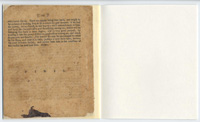 who careth for us. Since we cannot bring him back, nor ought to
who careth for us. Since we cannot bring him back, nor ought to
be desirous of making him so ill a return for past favours, if we had
the power, let us cherish in our hearts a vivid remembrance of him,
and keep his character alive and flourishing among us; which will be
bringing him back in some degree, and to very good purpose, by
putting it into his power still to do good offices among us, and much
to promote our benefit: For hereby we may be encouraged to tread
in his steps, and may in a little, perhaps a very little time, recover
his most desirable society, and rejoice with him in the mansions of
the blessed for ever and ever. AMEN.
FINIS